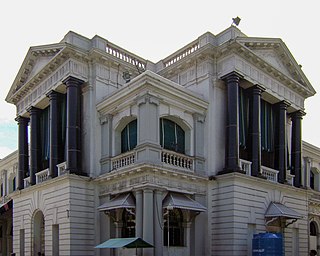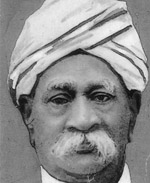Related Research Articles

The Dravida Munnetra Kazhagam is a social-democratic and Dravidianist political party in the state of Tamil Nadu and the union territory of Puducherry. It is one of the two main political parties in Tamil Nadu, along with the rival All India Anna Dravida Munnetra Kazhagam. Since the 2021 state election, it has been the ruling party of Tamil Nadu.

Fort St. George is the first English fortress in India, founded in 1639 at the coastal city of Madras, the modern city of Chennai. The construction of the fort provided the impetus for further settlements and trading activity, in what was originally an uninhabited land. Thus, it is a feasible contention to say that the city evolved around the fortress. The fort currently houses the Tamil Nadu legislative assembly and other official buildings.
The Anti-Hindi agitations of Tamil Nadu were a series of agitations that happened in the Indian state of Tamil Nadu during both pre- and post-Independence periods. The agitations involved several mass protests, riots, student and political movements in Tamil Nadu concerning the official status of Hindi in the state.

Tamil Nadu Legislative Council was the upper house of the former bicameral legislature of the Indian state of Tamil Nadu. It began its existence as Madras Legislative Council, the first provincial legislature for Madras Presidency. It was initially created as an advisory body in 1861, by the British colonial government. It was established by the first Indian Council Act of 1861, enacted in the British parliament in the aftermath of the Indian Rebellion of 1857. Its role and strength were later expanded by the second Council Act of 1892. Limited election was introduced in 1909. The Council became a unicameral legislative body in 1921 and eventually the upper chamber of a bicameral legislature in 1937. After India became independent in 1947, it continued to be the upper chamber of the legislature of Madras State, one of the successor states to the Madras Presidency. It was renamed as the Tamil Nadu Legislative Council when the state was renamed as Tamil Nadu in 1969. The Council was abolished by the M. G. Ramachandran administration on 1 November 1986. In 2010 the DMK regime headed by M. Karunanidhi tried to revive the Council. The current AIADMK regime has expressed its intention not to revive the council and has passed a resolution in the Tamil Nadu Legislative Assembly in this regard.

The Government of Tamil Nadu is the governing authority for the Indian state of Tamil Nadu. It is seated at Fort St George, Chennai. The legislature of Tamil Nadu was bicameral until 1986, when it was replaced by a unicameral legislature, like most other states in India.

P. Kakkan or fondly known as Kakkanji, was an Indian politician and freedom fighter who served as a member of the Constituent Assembly of India, Member of Parliament, President of the Tamil Nadu Congress Committee and in various ministerial posts in Congress governments in the erstwhile Madras state between 1957 and 1967.
Udupi Krishna Rau was a medical practitioner and politician of the Indian National Congress. He served as mayor of Madras city and as State minister.

The first legislative assembly Election to the Madras state based on universal adult suffrage was held in March 1952. This was the first election held in Madras state after the Indian Independence. This election was officially known as the 1951 Madras State Election, even though through delays, actual voting didn't take place until early 1952.

The second legislative assembly election to the Madras state was held on 31 March 1957. This was the first election held after the linguistic reorganization of Madras state in 1954. Indian National Congress and its leader K. Kamaraj won the election, and defeated its rival Dravida Munnetra Kazhagam. In 1954, due to the resignation of C. Rajagopalachari, for his controversial Kula Kalvi Thittam, the leadership of Congress was contested, between K. Kamaraj, and C. Subramaniam. Eventually, K. Kamaraj, won the support of the party, was elected leader and chief minister of Madras State in 1954. In a surprise move, he appointed both M. Bhaktavatsalam and C. Subramaniam, in his cabinet, allowing great unity amongst Congress, that ruled the state of Madras, for the next decade. This election saw future DMK leaders, M. Karunanidhi and K. Anbazhagan winning their first MLA seat in the legislative assembly.

The third legislative assembly election to the Madras state was held on 21 February 1962. The Indian National Congress party, led by K. Kamaraj, won the election. Dravida Munnetra Kazhagam made significant in-roads in the election and emerged as the second party for the first time by winning 50 seats.

The Tamil Nadu Legislative Assembly is the unicameral legislature of the Indian state of Tamil Nadu. It has a strength of 234 members of whom are democratically elected using the First-past-the-post system. The presiding officer of the Assembly is the Speaker. The term of the Assembly is five years unless dissolved earlier.
P.H. Manoj Pandian is a politician and current Member of the Legislative Assembly for Alangulam constituency. He was elected to the Tamil Nadu legislative assembly as an Anna Dravida Munnetra Kazhagam candidate from Cheranmahadevi constituency in 2001 election and former Member of Parliament from 2010 to 2016.

The second legislative assembly election for the Madras Presidency after the establishment of a bicameral legislature by the Government of India Act of 1935 was held in 1946. The election was held after 6 years of Governor's rule starting from 1939, when the Indian National Congress government of C. Rajagopalachari resigned protesting Indian involvement in World War II. This was the last election held in the presidency - after Indian independence in 1947, the presidency became the Madras state. The election was held simultaneously with that of the Legislative Council. The Congress swept the polls by winning 163 out of 215 seats. The years after this election saw factionalism in Madras Congress party with divisions across regional and communal lines. Competition among T. Prakasam, C. Rajagopalachari and K. Kamaraj resulted in the election of Prakasam as the Chief Minister initially. But he was later defeated by Omandur Ramaswamy Reddiar with Kamaraj's support. In turn, Reddiar himself was ousted to make way for P. S. Kumaraswamy Raja with the support of Kamaraj.

The first legislative council election to Madras Presidency after the establishment of dyarchical system of government by the Government of India Act, 1919, was held in November 1920. Indian National Congress boycotted the election due to its participation in the Non-cooperation movement. The election occurred during the early stages of non-Brahmin movement and the major issue of the election was anti-Brahminism. Justice party won the election with no significant opposition and A. Subbarayalu Reddiar became the first Chief Minister of the presidency.
C. Rajagopalachari was a Chief Minister of erstwhile Madras Presidency of Independent India. He was the first Indian National Congress member to assume office in Madras Presidency. He served as a Chief Minister for two terms spanning about five years. He was elected as a Chief Minister after 1937 elections in Madras Presidency and served till 1939. He was also the first Chief Minister to serve the Madras State after first elections held after Indian independence. His second term lasted from 1952 till 1954.
The second legislative council election for the Madras Presidency after the establishment of a bicameral legislature by the Government of India Act of 1935 was held in March 1946. The election was held after 6 years of Governor's rule starting from 1939, when the Indian National Congress government of C. Rajagopalachari resigned protesting Indian involvement in World War II. This was the last direct election held for the Madras Legislative Council in the presidency - after Indian independence in 1947, the presidency became the Madras state and direct elections to the council were abolished. The election was held simultaneously with that of the Legislative Assembly. The Congress swept the polls by winning 32 out of 46 seats. The years after this election saw factionalism in Madras Congress party with divisions across regional and communal lines. Competition among T. Prakasam, C. Rajagopalachari and K. Kamaraj resulted in the election of Prakasam as the Chief Minister initially. But he was later defeated by Omandur Ramaswamy Reddiar with Kamaraj's support. In turn, Reddiar himself was ousted to make way for P. S. Kumaraswamy Raja with the support of Kamaraj.

M. Muhammad Ismail Rowther was an Indian politician and social worker from Tirunelveli, southern Tamil Nadu. He is the founder of Indian Union Muslim League after the partition of British India (1947). He was popularly known in Tamil Nadu and Kerala as the "Quaid-e-Millat".

Rajaji Hall, previously known as the Banqueting Hall, Madras, is a public hall in the city of Chennai, India used for social functions. The hall was built by John Goldingham to commemorate the British victory over Tipu Sultan in the Fourth Anglo-Mysore War.